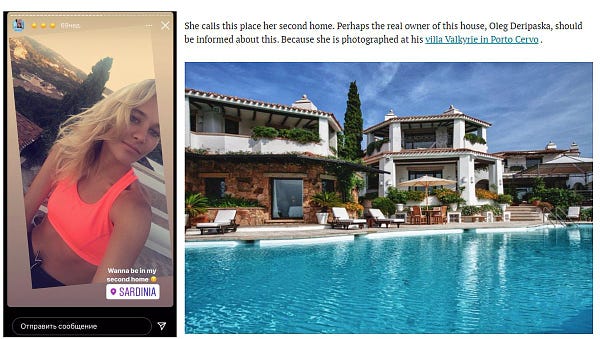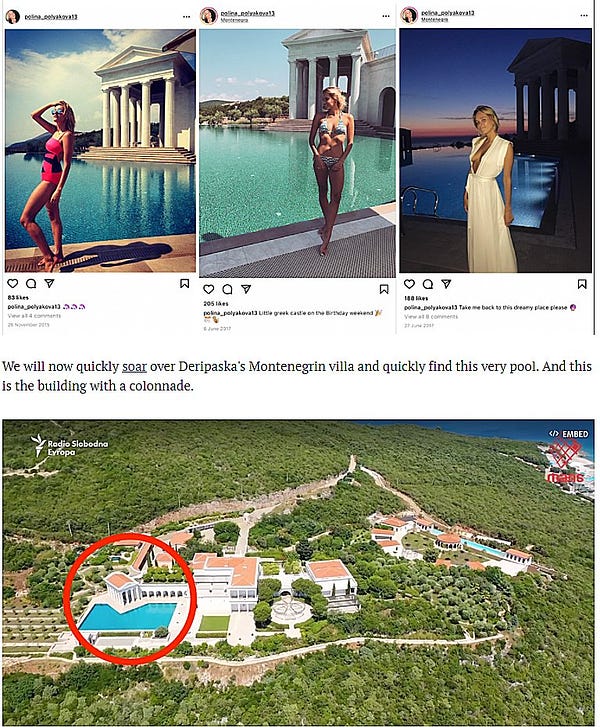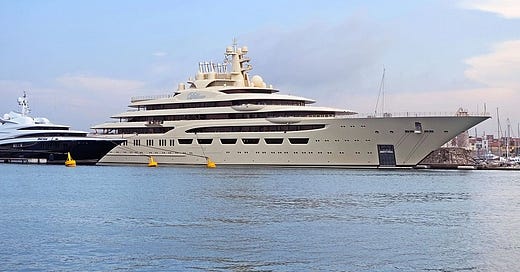What’s in your wallet?
When it comes to sanctioned Russian oligarchs, that’s what the investigative team at the Organized Crime & Corruption Reporting Project is trying to figure out. This week, the OCCRP released its “Russian Asset Tracker,” an inventory of which Putin-aligned elites own what.
Thanks to the bewildering and byzantine nature of international finance laws—the exploitation of which is the oligarch’s primary job function—this is harder than it should be. The Tracker is impressive, but hardly exhaustive. Take Alisher Usmanov, who with Roman Abramovich and Paul Manafort’s former creditor Oleg Deripaska is one of the three oligarchs in the Tracker’s database with over a billion dollars in known assets.1 Because Usmanov is such a wily and clever fuck, Western governments are finding that sanctioning him is easier said than done.
As the OCCRP’s Miranda Patrucic and Ilya Lozovsky ruefully report:
On paper, Usmanov holds only a 49-percent stake in his main business conglomerate, making it a difficult target because the U.S. Treasury uses a 50-percent threshold when imposing sanctions. (He has described this arrangement as a “coincidence.”)
And he has billions in assets that will be even harder to trace. The Uzbek-born businessman has spent years shuffling money around the world among various relatives, shell companies, and trusts.
Given Usmanov’s skill in exploiting the global financial system and its built-in loopholes, it’s unclear whether even identifying all of his assets is possible, much less sanctioning them.
This well-honed elusiveness is what makes Usmanov so valuable to Vladimir Putin—and, thus, so grotesquely wealthy.
Even so, the assets the OCCRP have been able to identify are staggering. The guy owns not one, not two, not three, but six coastal villas in Sardinia, worth over $60 million. He owns three lakeside villas in Bavaria, worth $25 million. When he travels to Great Britain—to meet, almost certainly, with the professional attorneys, accountants, and other professionals who help him manage his loot—he can flop at his $30 million mansion near Hampstead Heath, his $28 million mansion near Hampstead Heath, his $6 million building in Hyde Park, his $40 million Sutton Place estate, or Beechwood House, his $96 million (!) property on Hampstead Lane. A creature as corpulent as Usmanov requires ample room to spread out in; even so, that many manses seems excessive.
Not every rich Russian is an oligarch. And not every oligarch is intimately associated with Vladimir Putin. But you can’t be a citizen of the Russian Federation, and amass that large a pile of booty, without paying tribute to boss. As I wrote in Dirty Rubles,
After the rise of the oligarchs in the early 2000s, Putin had the richest, most powerful oligarch—Mikhail Khodorkovsky, head of the energy concern Yukos—arrested. At a humiliating show trial during which the accused oligarch was kept in a cage, Khodorkovsky was found guilty of fraud. He was sent to prison, and his sizable assets seized. After this sobering display, the other oligarchs approached Putin and asked what they needed to give him to avoid the same fate as Khodorkovsky, whose fate none of them wanted to share. Putin replied: “Half.” Since then, ill-gotten gains have poured into his coffers. The oligarchs boast fabulous wealth, but by virtue of claiming half of their money, Putin bests them all. Bill Browder has suggested that Putin may well be the world’s richest individual.
Oligarchs unwilling or unable to play ball were cut off long ago. The ones who remain possess an unquenchable lust for money and power, the canniness to exploit the loopholes in the international financial system, and the selfishness to not give a fuck that their wealth derives in the main from thievery. The most successful oligarchs are a cross between Marty Byrde and Omar Navarro: they combine the former’s creativity and know-how with the latter’s ruthlessness and greed.
Usmanov, Abramovich, Deripaska, and their ilk have all made their deal with the devil, and made peace with the decision. I would surmise that island-hopping in the Aegean on a $600 million superyacht—with the largest indoor pool ever installed on such a vessel—would make selling one’s soul a bit easier to swallow.
The purpose of sanctioning the oligarchs is to siphon away Putin’s own wealth—most of which was flat-out stolen from the Russian people. As Khodorkovsky himself wrote yesterday in Vanity Fair, “[W]e have to understand that even their wealth is not entirely their own. Much of it belongs to Putin and they are merely holding it for him, an alternative bank account for the regime to dip into as it sees fit.” As Moscow Never Sleeps put it on last week’s PREVAIL podcast, oligarchs “have no agency.” Seize that money, then, and you hit Putin directly.
Khodorkovsky explains:
Russia is not today an “oligarchy” but a dictatorship run as a criminal enterprise. Putin’s oligarchs are therefore not independent actors capable of wielding their power against the criminal at the top of the chain but merely his well-decorated minions. Their power is derived purely from their relationship with Putin. Therefore, they cannot be expected to do the right thing and use their wealth and power against him, because it is not their power and wealth to use, but Putin’s.
The chances of an oligarch taking out Putin, in other words, are slim to none.
“Everyone’s so focused on oligarchs,” Aja Raden tells me on today’s PREVAIL podcast. “They don’t realize: those are human wallets. They’re not going to kill him. They’re cowards, and they’re just a bunch of fat old men, and they mostly want this to stop so they can go back to banging their mistress in the Maldives.”
Even if the assets seized don’t move the needle that much—take all six Sardinian beach properties, after all, and Usmanov can vacation in Croatia instead—the lives of the oligarchs and their spawn have forever changed. Twitter accounts track their comings and goings on private jets and ostentatious yachts. Protestors gather outside their luxe properties. Squatters seize their swanky beach houses. Sybaritic step-daughters are being monitored on social media—and sanctioned. Instagram accounts have to be made private or deleted entirely:




That’s the thing about making a deal with the devil: in the end, you wind up in hell.
LISTEN TO THE PODCAST
S3 E2: Diamond Droogs & Human Wallets (with Aja Raden)
Greg Olear talks to his friend Aja Raden, author of STONED and THE TRUTH ABOUT LIES, about the new diamond industry documentary “Nothing Lasts Forever,” the Bitcoin bubble bursting, anti-Semitism as an indicator of Fascism, oligarchs, and the future of Vladimir Putin. Plus: an apocalyptic new film.
Follow Aja:
https://twitter.com/AjaRaden
Buy her books:
https://www.amazon.com/Aja-Raden/e/B013SJLVJI/ref=dp_byline_cont_pop_book_1
The trailer for “Nothing Lasts Forever:”
Photo credit: Jpchevreau. Usmanov’s yacht, Dilbar, anchored in Antibes (France) in April 2018.
The Tracker does not list Mitch McConnell among Deripaska’s assets, for some reason.





Obscene. I can think of no other word to describe them.
There is a financial saying called a "Haircut."
I can think of a number of folks that need one.
That reminds me that there are a number of barbershops in the US operated by somewhat recent arriving Russians.
(Not to be confused with the religious White Russians that came to the West coast in the early 1900"s).
About 10 years ago i dropped into a Barbershop operated by a Russian.
During the course of my haircut i was offered an opportunity to buy Opals and Gold.
Passing on that the barber said, "How about a woman?"
I'm old enough to recall that there were barbershops operated by Italians where you could place a wager or maybe buy a cold gun but not a woman.
My barber now is from Mexico.!